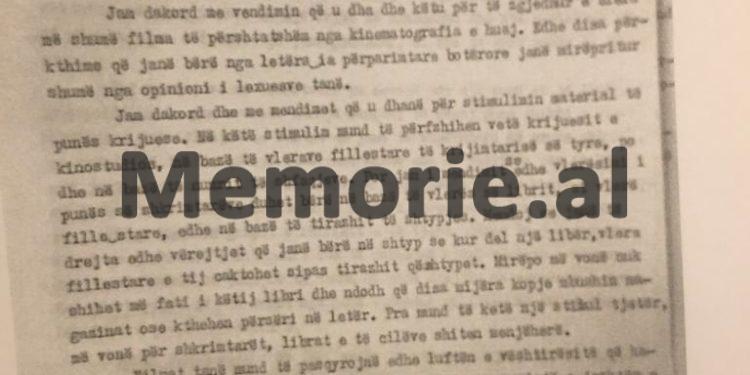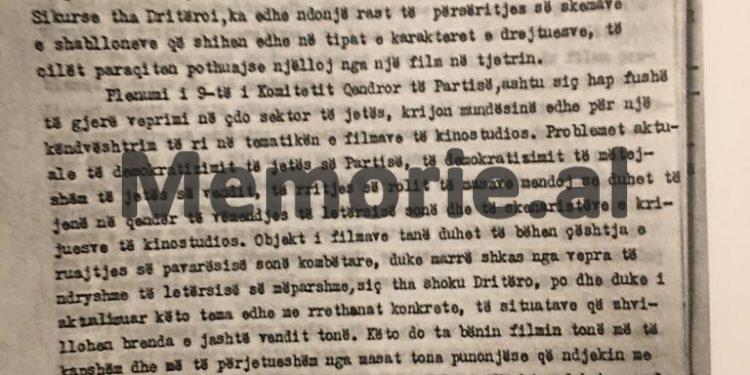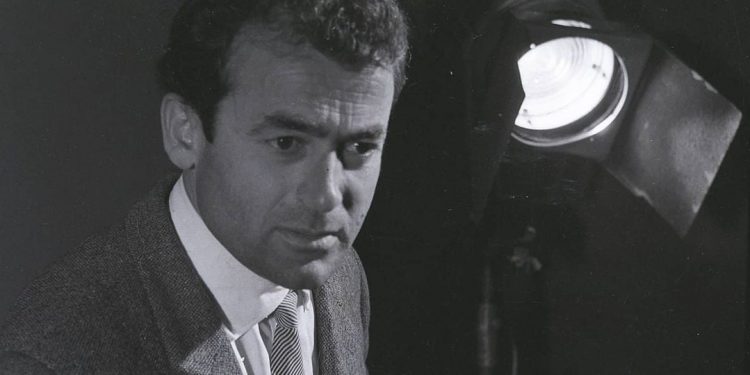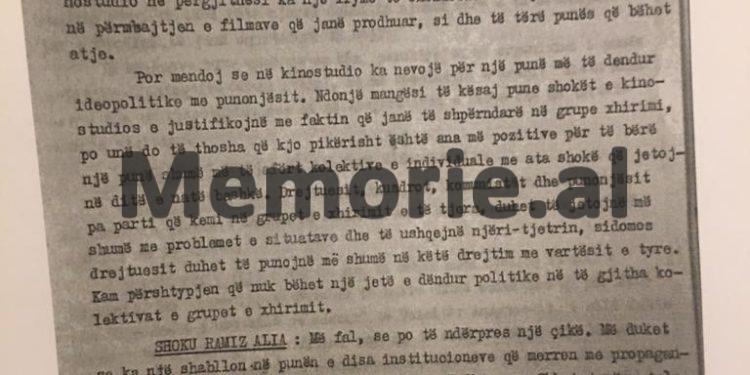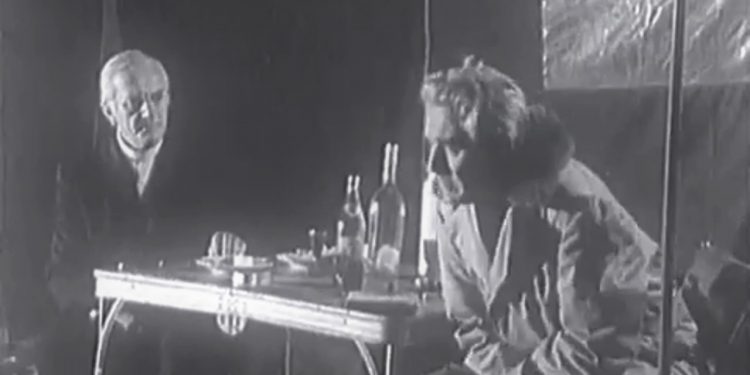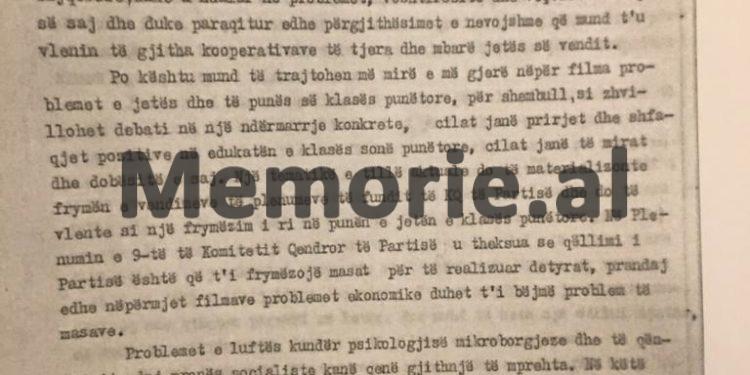Dashnor Kaloçi
Part six
Memorie.al publishes some archival documents extracted from the Central State Archive in Tirana (fund of the former Central Committee of the ALP), belonging to 1990, where there is a record of the meeting of the secretariat of the Central Committee of the ALP which, as the main item on the agenda, had “on some issues of today’s cinematographic creativity” and in that meeting which was chaired by the First Secretary of the Central Committee of the ALP and the Chairman of the Presidium of the People’s Assembly of The People’s Socialist Republic of Albania, Ramiz Alia, in addition to the secretaries of the Central Committee such as: Foto Çami, Hekuran Isai and Lenka Çuko, also participated some of the highest officials of the party and state leadership of that time, such as: Spiro Dede, Abdyl Backa , Ali Vukatana, Sotir Koçollari, Alfred Uçi, Dritëro Agolli, Lisen Bashkurti, Skënder Gjinushi, Neritan Babamusta, Dhimitër Shandro, Marash Hajati etc. The full minutes of the meeting with conversations and discussions between Ramiz Alia and the senior party and state leadership of that time, with the main leaders from the creative sector of Kinostudio “Shqipëria e Re”, such as: Teodor Laço, Dhimitër Anagnosti and Nexhati Tafa, who dwelled for a long time on the problems of Albanian cinematography.
“Both ways seem to be rational and useful. Complete studies are also necessary, e.g. students of the directing branch at the Higher Institute of Arts, can study for directing after finishing 3-4 years of school. In general, and in other parts of the world, directors prepare after graduating from high school. Directing studies are a second school for them. In many cases, those who prepare for directing do not go to the faculties of drama or directing, but to other faculties, especially the faculties of literature. We have not practiced this until today, but with those of the director, because at the present time usually the director of the film is also the author or co-author of the screenplay. This would be one way of full professional preparation. The second way is to prepare the staff we have with postgraduate courses with a short period of 1 year for directing. For example, this year we successfully closed a postgraduate course with 4 directing students, who made two good films. To prepare for the first road we sent a student to France who will study 4 years of directing. However, he is the only one and, in my opinion, seeing the demands that Kinostudio has today, it is very little …!”
This was stated, among other things, in his speech at one of the meetings of the secretariat of the Central Committee of the ALP of 1990, Teodor Laço, then head of the script editorial office at the Kinostudio “Shqipëria e Re”, a meeting on “Some issues of today’s cinematic creativity ”, which was chaired by the First Secretary of the Central Committee of the ALP and the Chairman of the Presidium of the People’s Assembly of the People’s Socialist Republic of Albania, Ramiz Alia, where in addition to other secretaries of the Central Committee, as Photo Çami, Lenka Çuko and Hekuran Isai, were also present in most of the senior party and state leadership of that time that had direct or indirect connections with art and culture. For more than what was discussed in that meeting where besides Teodor Laços, from Kinostudio “Shqipëria e Re”, participated also the director Dhimitër Anagnosti and the screenwriter, Nexhati Tafa, the document in question introduces us to the minutes of that meeting, which Memorie .al publishes it in full and for the first time in some issues of the dossier section.
Followed by the last number
Minutes of the meeting of the Secretariat of the Central Committee of the ALP, with the staff of the creative sector of Kinostudio “Shqipëria e Re”
COMRADE FOTO ÇAMI: Regarding the organization of work, we talked to the friends of Kinostudios to do a study to put the production of films on an economic basis, as a hozrashoti enterprise regardless of how much the state subsidy will be. All the new structures of Kinostudios should then be built on this basis. Such a change in the field of organization and reward, would set in motion all the work of Kinostudios and its people. They would get rid of a lot of the clutter and clutter we have in shooting movies that cost us dearly.
HEKURAN ISAI COMRADE: I was present when the number of films that Kinostudio and Television should make was discussed. I think that in our cinematography a great success has been achieved. Although we are a country with a small population, the development of cinematography ranks us next to the countries that have progressed the most in this direction. I have the impression that Albanian films, followed with interest in every family, are problematic, have the Albanian national spirit and psychology, which our people know and love. And if you compare our films with those of our neighbors, ours are ideologically and artistically sound. While over 80 percent of the films produced by Italian, Yugoslav, and Greek television stations are Hollywood films and do not convey the psychology of these countries. The main theme of our films, I think has been chosen with valuable educational motives. There have been cases of narrow conception of the topic, especially in some films that deal mainly with the education or re-education of the individual who has slipped from the healthy positions of society. I think that in these films, the topic could be addressed more broadly. As Dritëroi said, there is also a case of repetition of schemes and templates that appear in the features and characters of directors who appear alike from one film to another. Plenium i 9 i K.Q. of the Party, as it opens a wide field in every sector of life, creates the opportunity for a new perspective on the themes of Kinostudios films. The current problems of democratizing the life of the Party, and of the life of the country, of increasing the role of the masses, I think, should be in the center of attention from our literature and from the screenwriters and creators of Kinostudios. The object of our films I think should become the issue of preserving our national independence. Taking occasion from various works of previous literature, as Comrade Dritëro said, but also by actualizing these topics in concrete circumstances according to the internal and external situations of our country. These would make our film more accessible and more experiential by our working masses who follow with interest the situation in Yugoslavia, Greece, and the world. This is how the patriotic feelings of the youth are educated and formed. The problems of the life of the youth, I think that in the theme of Kinostudios films occupy an important place. Generally, our films are liked and discussed by the youth, on the street and everywhere. Even in the future I think this is an important task in the context of the work that the Party carries out with the youth. Somewhat poorer in Kinostudios movies is the village theme. In the spirit of the 9th Plenum K.Q. of the ALP, the problems of village development could be a very interesting topic. Such topics can be treated in comparison with the socialist economic systems of other countries, which degenerated, destroyed and overthrew this system. One can even write a scenario for an agricultural cooperative, analyzing all its problems and advantages. Likewise, the problems of working-class life, how the debate takes place in an enterprise, etc. can be better addressed. The problems of the struggle against micro-bourgeois psychology and the attitude towards socialist property are always acute. In this regard, the Party has constantly fought and won. Other problems that I think may be the object of our cinematography, are those related to the ideo-cultural level of the masses. In the 8th and 9th Plenums of the Central Committee, it was pointed out that while there is a colossal change in the cultural and artistic level of the masses (80 percent of the employees in the brigades are with high school, and in production we have thousands of engineers and specialists) it must be acknowledged that the working methodology has lagged behind. I agree with the opinion that more suitable films from foreign cinematography should be selected and purchased. Some translations that have been made of progressive world literature have been welcomed by our opinion. I also agree with the opinion of material incentives for creative work. The creators of Kinostudios themselves can be included in this stimulus based on their creativity. I am also of the opinion on the evaluation of the writers’ work, on the basis of the value of the book, as well as on the basis of the print run. The remarks made in the press are right that when a book is published, its initial value is determined by the circulation number. But later, the fate of this book is no longer seen, which leads to filling the warehouses with the remaining copies and turning them into paper. So, there may be another incentive for writers whose books sell out right away. Our films can also reflect the war and the pressures we face with external and internal enemies. Now many cultural needs for our youth are met by television. Our young people know foreign languages and watch various TV movies from neighboring stations and from around the world. Therefore, our propaganda must be subtle and careful in this regard. In addition, a few foreign tourists used to come to Albania, while now many tourists, traders, etc. come. So, pressure is exerted from all sides and our people need to be prepared. Communication with the world today is inevitable but our means of propaganda must grasp and deal intelligently with the problems required by time and the development of situations.
COMRADE PIRRO KONDI: I also had some thoughts. First of all, I wanted to reiterate what my friends said that in the film studio, there is a sound spirit and this is reflected in the content of the films that have been produced and, in the work, done there. But I think that in Kinostudio, we need a more intense ideological and political work with the employees. Kinostudios’s friends justify the shortcomings of this work with the fact that they are distributed in filming groups. But this is positive as collective and individual work can be done with friends working day and night together. I have the impression that there is not a dense political life in all film crews and groups
COMRADE RAMIZ ALIA: Excuse me for interrupting you a little. It seems to me that there is a template in the work of institutions dealing with propaganda. I am taking Kinostudio, the Writers’ League, Television and the newspaper which are deeply ideological and political bodies. All these organizations, convey the line of the Party and explain it each in the genre of art to which it belongs. So, it cannot be conceived that Kinostudio, whether its employees are party members or not, has ideological and political differences. Clear fighters for the Party line in this organization, must be whole. Because they militate for the same issue. So, should the employees of Television, newspaper, etc. The employee of Kinostudios when making a film, aims to achieve something, to convey a message of our philosophy. For this purpose, he finds the means and the way. I emphasize these issues because I have the impression that the ideo-political organization is done in the same way, both in the wood factory and in Kinostudio, both in the Peza cooperative and in Kinostudio.
COMRADE PIRRO KONDI: There is some differentiation ….
COMRADE DRITERO AGOLLI: For example, in the Writers’ League, the forms of education focus more on the aesthetic side. So, they do not do the same to others.
COMRADE RAMIZ ALIA: There is no need to make the same forms of education everywhere. For example, it would be worthwhile for the film “The General of the Dead Army” by Dimitar Anagnosti, which is one of our best films, to have a collective conversation with the employees of the film studio. There Dhimitri can talk about how and why he conceived the film in this way. Thus, the patriotic purpose and spirit, patriotism and strength of the people would be highlighted. So, trumpeting, both through the film and through conversation with his colleagues, a major educational issue, Dhimitri does his job as a communist, charged or not by the Party.
Is there more effective than this form of education in the specifics of such a collective, where by explaining some details, which are artistic, professional, a whole ideological, political, etc. content is transmitted.
This can be done not only in Kinostudio, but also on Television. Even the director Vera Grabocka, who builds the script of a festival, can talk to the collective about what thoughts and ideas she intends to convey through it. Pirro Milkani, who recently appeared on the television screen as a conference speaker and did a very good job, could also have an interesting conversation. He, too, with the way he leads the show, conveys some thoughts, some ideas which he can deconstruct and make known to the Television staff, or to those who are interested in this work.
Thus, educational and political work with people could not be done in the old classical forms, but in accessible forms, according to the working environments and interests, and this practice would be worth more than a theoretical explanation or breakdown of the decisions of the 9th Congress. of the Party, etc.
Creative discussions are a great educational work.
Nexhatiu said that the topics of motives for scenarios can be taken from Kosovar literature. This task is politically difficult, but how interesting it would be to reflect the war that Kosovars are waging. How inspiring for every Albanian are the attitudes of those Kosovar boys 10-12 years old who come out in front of the tank with great bravery and heroism! Can a cinematic work be realized with these motives? The patriotic spirit of these attitudes is great and we currently need to cultivate this spirit in our people. But an avoidance is required of the political implications that may arise. However, some ways can be found to overcome these difficulties, and there can be some discussion among creators for this purpose.
COMRADE PHOTO ÇAMI: Ismail Kadare found a way to write such a topic…
COMRADE RAMIZ ALIA: Yes, Ismaili achieved this in the novel “Krushqi are frozen”. Artists can find the ways they are looking for. In literature it is probably easier to find ways, than literature maneuvers with phraseology, whereas in film, the transmission is done with pictures, so it is a bit difficult. /Memorie.al
Continues in the next issue





